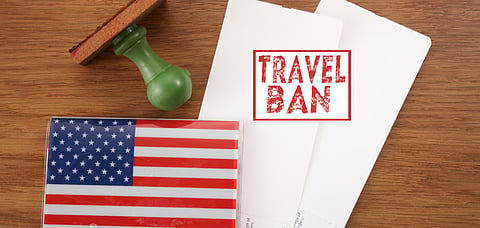

With the rising number of virus cases in India, an increasing number of countries across the world are issuing travel bans and restrictions on travel to and from India.
The US is the latest to join the list of countries.
The Bisen government has issued a proclamation restricting travel from India. The ban is set to be implemented from 12.01 am eastern daylight time on May 4.
"On the advice of the Centers for Disease Control and Prevention, the administration will restrict travel from India," Press Secretary Jen Psaki said in a statement on April 30.
She cited "extraordinarily high COVID-19 caseloads and multiple variants circulating in India" as the reason for the policy.
The policy, which was announced on April 30, stated that non-residents who have been to India in the past 14 days will not be permitted to enter the US.
The ban however does not apply to those on a flight scheduled to arrive in the US that departed prior to the given cut-off time.
The travel ban was announced after the US Centre for Disease Control and Prevention (CDC) studied the characteristics of the Indian variant and advised the government to take proactive measures to protect America's public from travellers entering the country.
The ban will not be applicable for a permanent resident of the US, a non-citizen who is the spouse of a lawful permanent resident of the US, and a non-citizen national of the US. Some categories of students, academics, journalists and other individuals have also been exempted from the travel ban.
Students who have already procured valid F-1 and M-1 visas intending to begin or continue their academic programme in August, or later, may enter the US not earlier than 30 days before their academic calendar begins. Students qualified for an F-1 or M-1 visa will automatically be considered as qualified travellers.
The US stated that these exemptions are similar to those given to some categories of travellers from China, Brazil, Iran and South Africa.
Individuals providing critical infrastructure support in countries affected by a geographic COVID-19 restriction and travellers seeking to enter the US for purposes related to public health response, humanitarian travel, and national security will also be granted NIEs.
This proclamation was issued in the national interest of the United States and will remain in place until terminated by President Joe Biden.
As the global situation evolves, the US Department will continue to seek ways to process more visas but the pandemic has limited the number of visas the embassies and consulates abroad can process.
The other major countries that have imposed a travel ban on India are the UK, Canada, the UAE, Australia, Oman, Hong Kong, Singapore, Saudi Arabia. New Zealand and Australia have prohibited their own citizens from entering their borders due to their visit to India.
Update Indian students with valid M-1 and F-1 visas will be allowed to travel to the USA if they have an academic session scheduled to begin or reopen from August 1. They will have to reach USA no earlier than a period of 30 days before their academic programs start.
The USA government has also allowed students from countries like China, Brazil and South Africa to join their academic programs from August 1. Such students are being treated as a National Interest Exception by concerned authorities.
This story was first published on May 1, 2021.
